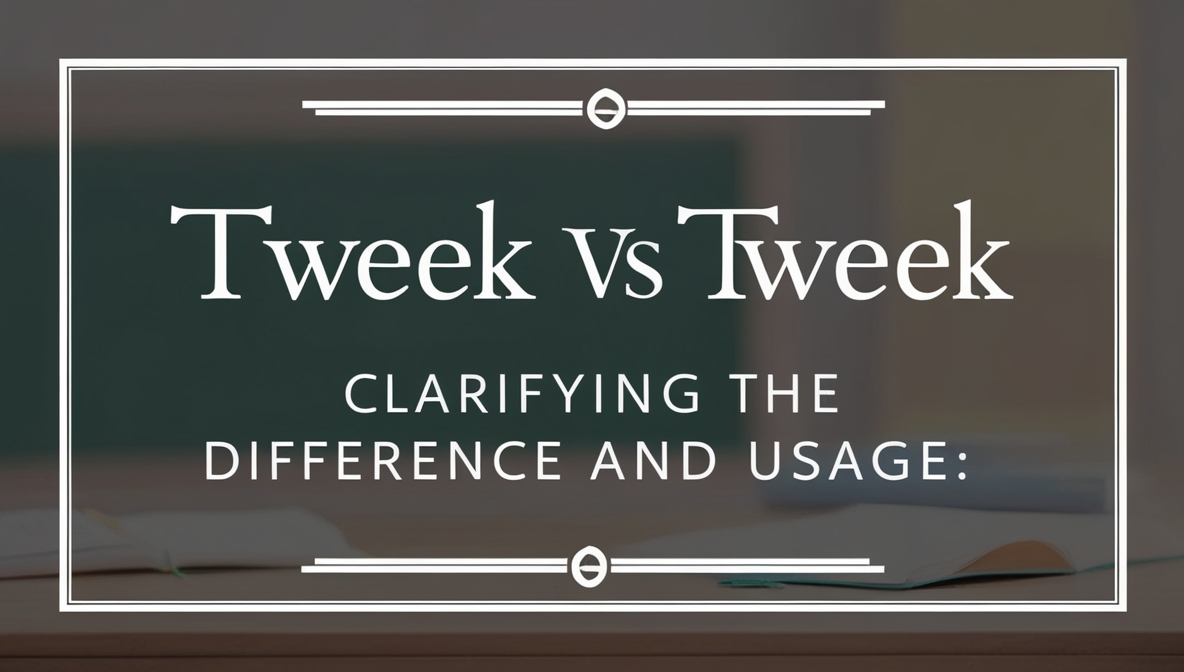In the realm of the English language, confusion often arises between words that sound similar but have distinct meanings. Two such words are “tweek” and “tweak.” While they may seem interchangeable at first glance, understanding their differences can enhance your communication skills and ensure clarity in your writing. This article delves into the meanings, usages, and scenarios of these two terms, helping you avoid common pitfalls.
What Does “Tweak” Mean?
The word “tweak” is a verb that means to make small adjustments or modifications to something. It can apply to a wide range of contexts, from technical adjustments in a machine to subtle changes in a piece of writing. The essence of tweaking is about improving or fine-tuning rather than making drastic changes.
Examples of “Tweak” in Context
- Adjusting a Recipe: Imagine you’re experimenting in the kitchen. You might say, “I need to tweak this recipe by adding a pinch of salt.” Here, you’re making a minor adjustment to enhance the flavor of your dish.
- Editing a Document: Let’s say you’ve written a report. You might tell your colleague, “I’ll just tweak this section before submitting it.” This indicates you’re planning to refine or polish your writing for clarity or impact.
- Modifying a Software Program: In the tech world, a developer might say, “We need to tweak the code to improve performance.” This reflects minor changes that can lead to significant improvements in functionality.
What Does “Tweek” Mean?
On the other hand, “tweek” is often considered a misspelling of “tweak.” In some contexts, it may refer to a specific usage in slang, particularly in relation to certain subcultures or communities. However, it does not have a widely recognized definition in standard English.
Understanding “Tweek” in Slang
In slang, particularly within certain circles, “tweek” can refer to someone who is under the influence of a stimulant drug, often characterized by erratic or hyperactive behavior. For example, you might hear, “He’s been tweaking all night.” This usage emphasizes a particular state of being rather than an action of adjustment.
Key Differences Between Tweak and Tweek
Meaning and Usage
- “Tweak” is a recognized verb in English that implies making minor adjustments for improvement.
- “Tweek”, while sometimes used informally, does not have a standard or accepted definition beyond its colloquial implications.
Contextual Clarity
Using “tweak” in your writing or conversation enhances clarity and demonstrates a solid grasp of the language. Conversely, using “tweek” may lead to confusion or misinterpretation, especially in formal contexts.
Scenarios Illustrating the Difference
Scenario 1: The Office Environment
Imagine you’re in a meeting discussing a marketing strategy.
Team Leader: “I think we should tweak the ad campaign to target a younger audience.”
Using “tweak” here communicates the need for small adjustments to refine the strategy. If someone mistakenly used “tweek,” it could lead to confusion about the intended meaning.
Scenario 2: The Kitchen Experiment
In a cooking class, an instructor might say:
Instructor: “If the sauce is too tangy, you can tweak the ingredients by adding sugar.”
This usage emphasizes a thoughtful adjustment to improve the dish. If a student were to respond with, “I’ll just tweek it,” it might raise eyebrows due to the unconventional use of the term.
Scenario 3: The Tech Team
During a software development meeting, a programmer might suggest:
Programmer: “We need to tweak the user interface to make it more intuitive.”
The use of “tweak” here clearly indicates the intention to make minor adjustments for enhancement. A reference to “tweek” might lead colleagues to think about something entirely different, potentially derailing the discussion.
Common Mistakes to Avoid
Misusing “Tweek”
One of the most common mistakes is using “tweek” in place of “tweak.” This can often happen in casual writing or speech, where the distinction may not be apparent. To avoid confusion, always remember that “tweak” is the correct term when referring to adjustments.
Overlooking Context
Another mistake is neglecting the context in which these words are used. While “tweak” is versatile and applicable in various scenarios, “tweek” should be reserved for specific informal contexts, mainly relating to slang.
Conclusion
Understanding the difference between “tweak” and “tweek” is essential for effective communication in English. By recognizing that “tweak” refers to minor adjustments aimed at improvement, while “tweek” has limited slang connotations, you can enhance your writing and speaking skills.
Next time you’re faced with the choice between these two words, remember the contexts and meanings discussed here. A simple tweak in your vocabulary can lead to clearer communication and a more polished expression of your ideas. Embrace the nuances of language, and you’ll find that even small changes can make a significant difference.

